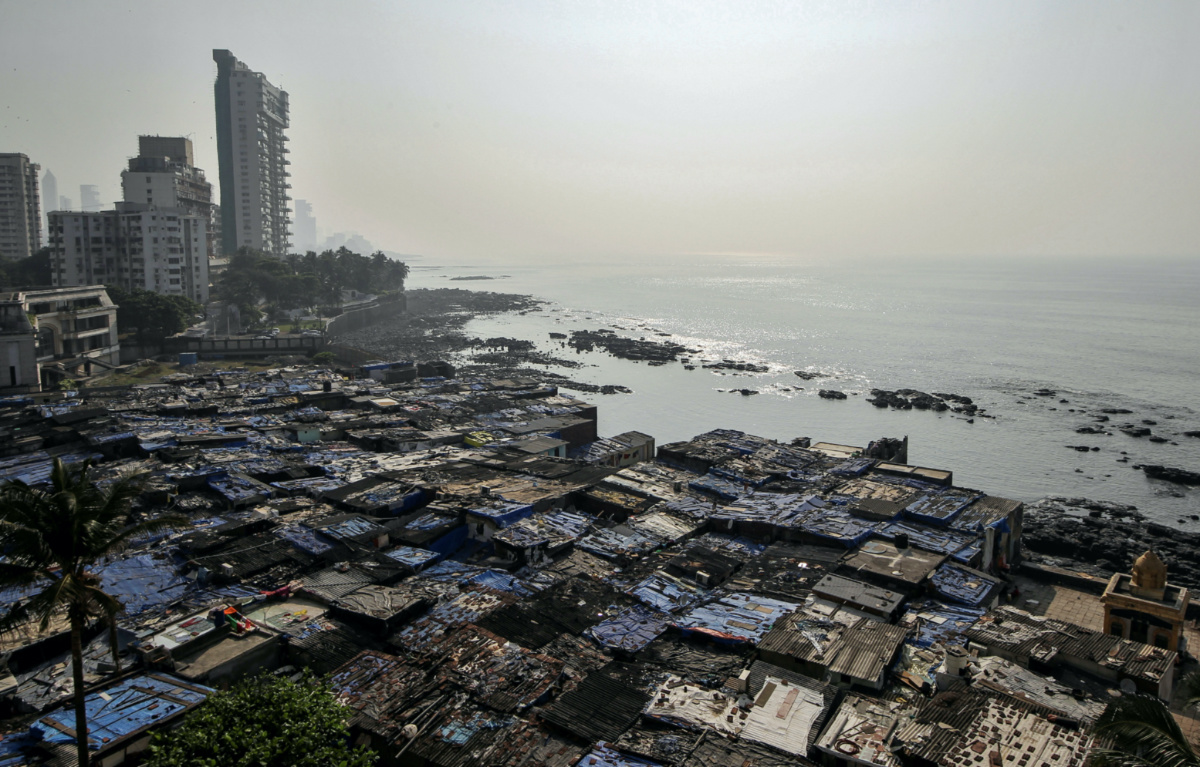London, UK
Reuters
Tackling inequality is key to securing the public support needed to overhaul the global economy and reverse climate change, an update to the landmark 50-year-old computer simulation of environmental stress has found.
Based on modelling by MIT scientists of a world destabilised by growing consumption, the 1972 “Limits To Growth” simulation has been attacked as flawed by some but applauded by others as prescient of accelerating planetary stress.

A view of a slum is seen along a seashore in Mumbai, India, on 28th November, 2019. PICTURE: Reuters/Prashant Waydande/File photo.
Building off its predecessor, the Earth4All model developed by a cross-discipline team of researchers sought to explore what it would take to increase the wellbeing of humanity during the rest of this century using data from the 1980-2020 period.
AFRICAN LEADERS: RICHER NATIONS MUST PAY MORE TO PREPARE FOR CLIMATE CHANGE
African leaders called on Monday for their counterparts from richer, polluting nations to increase funding for projects to help them adapt to climate change.
Countries on the continent are seeking to raise $US25 billion of investments in the next three years for adaptation projects, including improving agricultural resilience and updating infrastructure.
“If we want our continent to thrive, we have to adapt to climate change – and to achieve this, adaptation financing needs to start flowing at scale,” Ghana President Nana Afuko-Addo told the Africa Adaptation Summit in Rotterdam on Monday.
The African Development Bank said it had already committed half the amount needed for the Africa Adaptation Acceleration Programme. They were looking for the world’s big polluters to step in.
“Africa does not contribute more than three per cent of global greenhouse gas emissions, but suffers disproportionately from its negative consequences,” African Development Bank President Akinwumi Adesina told the event.
Britain, Norway, France, and Denmark announced $US55 million in new contributions on Monday.
But Senegal’s President, Macky Sall, said he was disappointed by how few of their leaders had turned up for the event.
“I cannot help but note with some bitterness the absence of leaders from the industrial world,” said Sall, who is also chairperson of the African Union.
“I think if we made the effort to leave Africa to come to Rotterdam, it would be easier for the Europeans and others to be here because they are the main polluters”.
Dutch Prime Minister Mark Rutte was the only European leader to attend in person, alongside heads of state from Senegal, Ghana, Gabon, Democratic Republic of the Congo and Ethiopia.
World powers meeting in Glasgow last year pledged to double the funding for such “adaptation projects” for developing countries to around $40 billion a year by 2025.
They are expected to meet again in two months time in Sharm El Sheikh, Egypt for the UN climate summit COP27 – dubbed “the African COP” – with climate finance a major focus.
– GLORIA DICKIE, London, UK/Reuters
Its central conclusion was that, if left unchecked, rising inequality in the next 50 years would leave people less trusting of governments and other institutions, making co-operation to deal with climate change and other threats more difficult.
“When social trust goes down, this limits the speed of public policy action. This translates into how much regulation and subsidies you can do in terms of greening the economy and energy system,” study co-author Per Espen Stoknes told Reuters.
To track wellbeing, the researchers created an ‘Average Wellbeing Index’ using data including disposable income, income inequality, government services, the climate crisis, perceived progress, and their relationship to measures of social trust.
Using two scenarios – labelled ‘Too Little Too Late’, with no change to human behaviour, and ‘The Giant Leap’, where the world’s economic and social systems are transformed – the model seeks to show how differing policies would impact the world.
Under the business as usual scenario, the wellbeing of the average worker – taken to mean those who spend most of what they earn in a year – peaks around the year 2000, before declining out to 2050 and then levelling to 2100, despite continued growth in the global economy over the same period.
By making changes such as phasing out fossil fuel use, putting adequate pensions in place, taxing the richest 10 per cent more and cancelling the debt of low-income countries, the Giant Leap pathway allowed wellbeing to continue to rise.
The model estimated the pathway leading to a stabilisation of global temperatures below two degrees Celsius above the industrial era and eradicating to poverty by 2050 would cost two to four per cent of global output, or between $US2 trillion to $US4 trillion annually.
By comparison, the International Monetary Fund estimated that governments together put in $US9 trillion of fiscal support for their economies in the first five months of the coronavirus pandemic alone.
“We absolutely need to place a value on social and environmental and economic indicators at the same level,” said co-author Sandrine Dixson-Decleve, co-president of the Club of Rome thinktank which originally published the “Limits To Growth” report.
“Inequality and poverty play a huge role in enabling us to move forward,” she added. “Net-zero poverty has to be as much of a goal as net-zero emissions.”
A book outlining the results of the model, Earth for All: A Survival Guide for Humanity will be published in German on Tuesday, with versions in English and other languages following.
Doug Heske, chief executive of US-based Newday Impact Investing, signalled its value for ESG investors.
“Earth for All provides a powerful new framework for how responsibly-minded investors can thoughtfully allocate capital in ways that will have the greatest impact,” he said.
– Additional reporting by MARK JOHN






